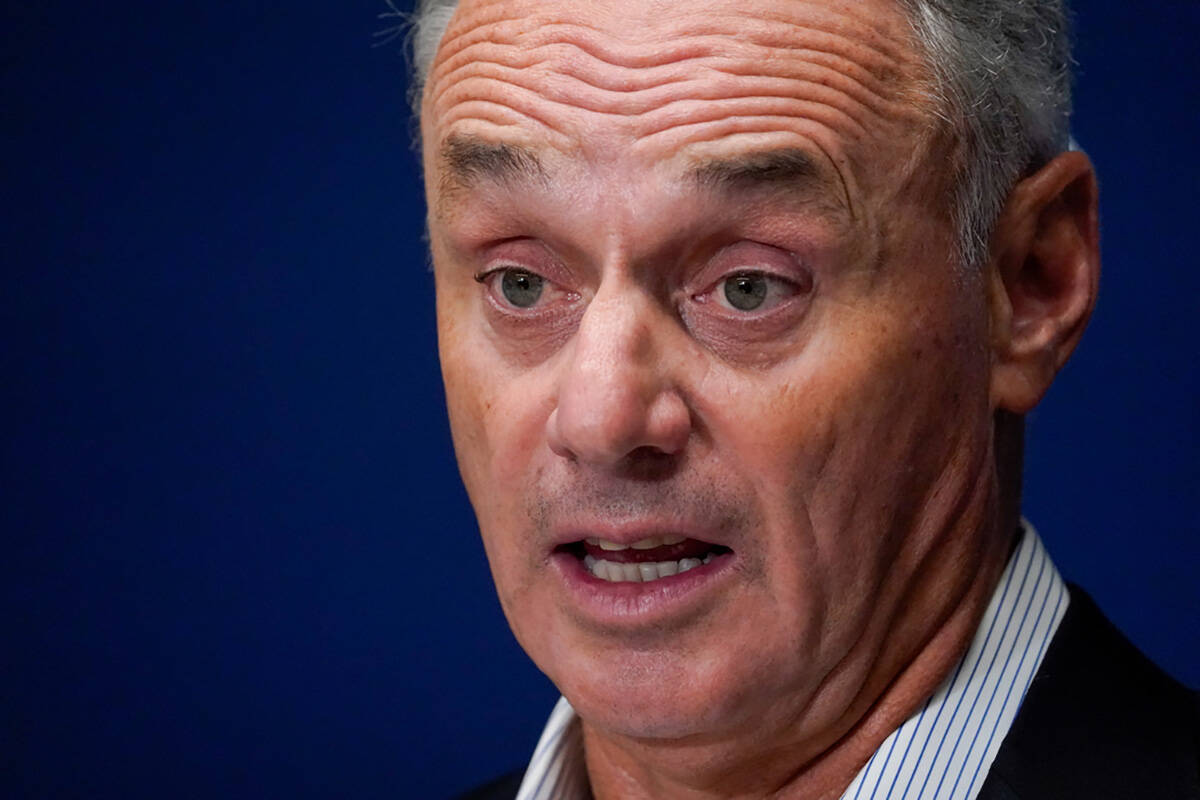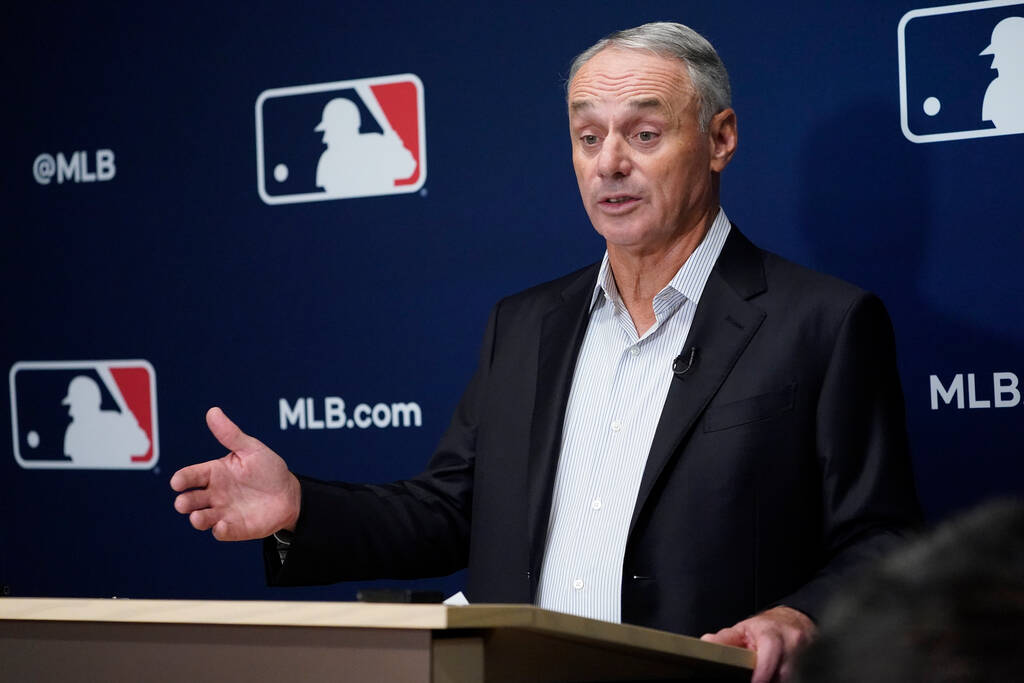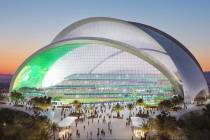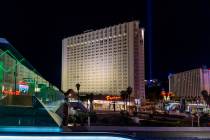Manfred sorry for Oakland fans, details what’s next for A’s move
MLB Commissioner Rob Manfred on Thursday defended his support for the Oakland Athletics’ pending relocation to Las Vegas and detailed next steps in the process.
His comments came a day after the Legislature passed the team’s $380 million stadium financing bill, and came before the bill was signed into law Thursday by Gov. Joe Lombardo.
Despite the A’s and city of Oakland and Alameda County officials working for years on the proposed $12 billion, mixed-use Howard Terminal project, that included a $1 billion ballpark, Manfred questioned the commitment Bay Area officials had to that project.
“I feel sorry for the fans in Oakland. I do not like this outcome,” Manfred said in a news conference following an MLB owners meeting in New York. “I understand why they feel the way they do. I think that the real question is what is it that Oakland was prepared to do? There is no Oakland offer. They never got to the point where they had a plan to build a stadium at any site.”
The Oakland City Council in July 2021 approved their own version of a term sheet for the Howard Terminal project, one the A’s found problematic. The two sides had been working to bridge the gaps between them since then, all while the team was continuing its relocation search in Southern Nevada.
Those issues were mainly tied to affordable housing, offsite infrastructure costs and community benefits details.
There were “parallel paths” in Oakland and Las Vegas, according to A’s President Dave Kaval, until the A’s announced they would be shifting their ballpark efforts toward Las Vegas in April.
Oakland Mayor Sheng Thao issued a statement calling Manfred’s comments “totally false,” noting the extensive work area officials put into trying to land the Howard Terminal deal, much of which occurred while she was a city council member, before being sworn in as mayor earlier this year.
“There was a very concrete proposal under discussion and Oakland had gone above and beyond to clear hurdles, including securing funding for infrastructure, providing an environmental review and working with other agencies to finalize approvals,” a spokesperson for Thao said in a statement.
The A’s Las Vegas ballpark would take 9 acres of the 35-acre Tropicana site, with the resort’s owner, Bally’s Corp. planning to redevelop the remaining 26 acres at a later date.
Thao further noted if the A’s presented Oakland officials with a similar, ballpark-only project, as is being planned in Las Vegas, that work on a Bay Area stadium would already have begun.
What’s next?
Now that bill has been signed into law, the A’s next step toward moving to Southern Nevada would be gaining MLB approval.
The process includes the A’s filing an application to the relocation committee, which will be reviewed. The process won’t happen overnight and could take months to play out.
In the A’s relocation application, they must detail what their new ballpark efforts were in Oakland and note why Las Vegas would be a better market for the team, Manfred noted Thursday.
With Las Vegas set to be a new market for MLB, the committee will define the new operating territory and television territory and would then make a recommendation to Manfred and the eight-man executive council.
After review of the A’s relocation application, the league will at some point call for a vote of MLB team owners.
That vote does not have to occur at an in-person meeting, a person with knowledge of the process told the Review-Journal. MLB could schedule a conference call, likely via zoom, and conduct the vote of the owners virtually, the source said.
The A’s would need 75 percent of MLB owners (23 owners) to vote in favor of their move to Southern Nevada to make it official with the league.
If the move is approved, Las Vegas would become the fourth home for a franchise that started in Philadelphia from 1901-54, moved to Kansas City for 13 seasons and arrived in Oakland for 1968.
The A’s would be the second MLB team to change cities in more than a half-century. Since the Washington Senators became the Texas Rangers for 1972, the only team to relocate has been the Montreal Expos, who became the Washington Nationals in 2005.
Doing due diligence
After the team is approved by MLB to move to Las Vegas, the team would need to strike various agreements with the Las Vegas Stadium Authority.
The stadium authority would strike nonrelocation, community benefits and development agreements with the A’s, in similar fashion to what the board did with the Raiders and the construction of Allegiant Stadium.
The nonrelocation agreement will be for 30 years, or the same length that the bond payments that will be repaid via the public money used tied to SB1.
From there the team would develop the stadium architectural plans and look to secure the various permits and approvals needed to construct a $1.5 billion, 30,000-seat ballpark on the Strip.
The A’s would also work with the county to review what infrastructure improvements would be needed to ensure proper ingress and egress to the stadium.
Before the stadium construction would begin, likely at the end of 2024, Tropicana owner Bally’s Corp. would need to demolish the Tropicana to make way for the stadium.
Bally’s Corp Chairman Soo Kim told the Review-Journal that the demolition timeline is still being developed. Option included partially tearing down a portion of the Tropicana, leaving some still in operation as ballpark work begins, or completely demolishing the hotel-casino.
The Associated Press contributed to this report.
Contact Mick Akers at makers@reviewjournal.com or 702-387-2920. Follow @mickakers on Twitter.




















